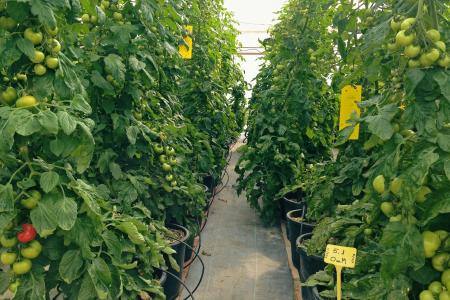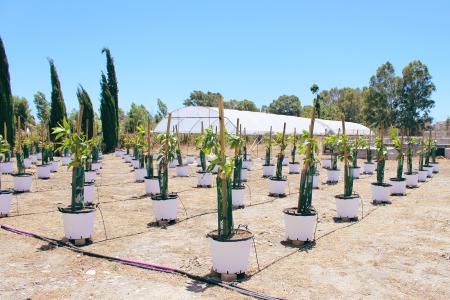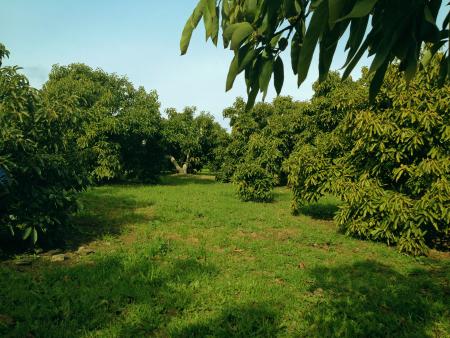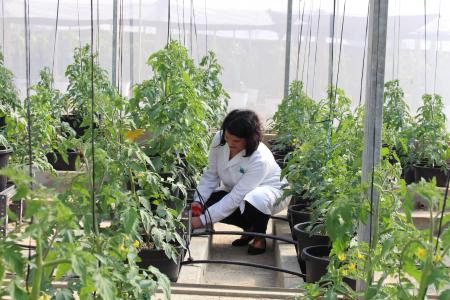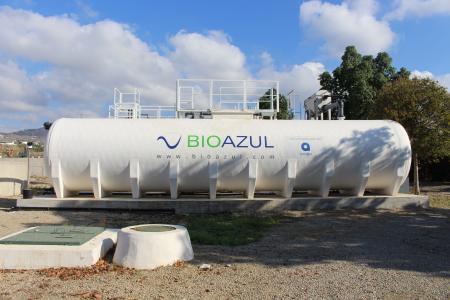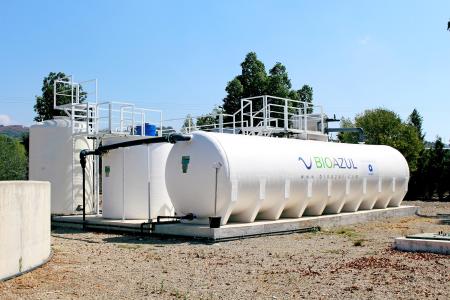
Area characterisation:
RichWater® has been designed and installed in an experimental plot next to the Wastewater Treatment Plant (WWTP) of the municipality of Algarrobo (Málaga), a dry region located in southern Spain. Next to the WWTP there is another experimental plot with crops and the mixing station. This innovative technology offers an efficient and low-cost treatment of the municipal wastewater from Algarrobo, which is transported to the WWTP through a collection system. RichWater® receives raw wastewater from the WWTP and, thanks to a Membrane Bioreactor (MBR) combined with a mixing station, an optimal combination of water and nutrients is obtained.
Objective:
Water scarcity and low availability of water present a real obstacle to implement and maintain nature-based solutions such as urban agriculture and other peri-urban farming practices. The use of reclaimed water (i.e. treated wastewater) is an alternative water resource with many benefits associated.
Images
Financing:
RichWater® was funded by the European Commission's Horizon 2020 R&D program. Thus, the project has received a total of € 1,658,703.13, which has been used for the successful demonstration of the modular wastewater reuse system. Subsequently, it was funded by the European BRIGAID project - that offers support for innovation in adaptation to climate change - being selected in a European competition for its high degree of innovation. Moreover, some of the partners participating in this project created in 2017 the Operational Group "AXARQUÍA SOSTENIBLE", for which the Ministry of Agriculture, Fisheries and Rural Development of the Junta de Andalucía was requested a sum of € 5,000 (final amount granted was € 4,550, file number: GOP1I-MA-16-0004). The members of the Operational Group are currently waiting to receive financing for the operational phase of the innovative project, which will allow the continuity and expansion of the activities developed in RichWater®.
Potential impacts/benefits:
Wastewater offers an enormous potential to meet agricultural demands in a context of water scarcity, provided it receives the appropriate treatment. The use of reclaimed water is presented as an alternative water resource for agriculture that has certain advantages over other conventional sources. In fact, Spain is at the forefront in Europe as it reuses 10.74% of treated wastewater, compared to 2.4% as average in Europe. Reclaimed water is therefore a decentralized resource in the territory, of continuous availability, that does not depend on climatic events and that provides nutrients that can be directly assimilated by plants.
RichWater® offers an innovative solution capable of supplying a constant source of nutrient-rich water for use in agriculture that can complement other conventional sources (e.g. well water, aquifer, etc.). This solution integrates both the wastewater treatment and the irrigation module in a single system that offers the possibility of automating and controlling the volume of additional water and its quality through the use of sensors. It is a system of easy operation and maintenance that provides a high-quality effluent in compliance with the Spanish Royal Decree 1620/2017 and EU Regulation 2020/741 of the European Parliament and of the Council for irrigation in agriculture.
The implementation of RichWater® acts as a driver in the modernization of agricultural technology while generating employment of quality, not only in the design, manufacturing, and commissioning of our systems, but also in the maintenance and operation. On the other hand, the availability of reclaimed water and its use in agriculture plays a fundamental role in the so-called “rural renaissance”, allowing the conservation of the rural environment and its ecosystem services. Likewise, it contributes to avoiding rural depopulation and promotes the labour integration of women, a determining factor for the territorial and social structure of the environment and one of the main vectors for rural innovation and entrepreneurship.
The use of reclaimed water also contributes to the water sovereignty of farmers in areas affected by water scarcity and droughts since the combination of this resource with more conventional ones can avoid supply cuts and the consequent food production losses. Therefore, it implies a reduction in demand and water pressure on other sources for drinking water which may be used for other priority uses, such as tourism or industry.
Lastly, the treatment provided by RichWater® allows the recovery of nutrients, reducing the risk of suffering environmental problems (e.g. eutrophication) due to excess of such compounds in the water bodies receiving wastewater. These nutrients can be directly assimilated by plants, which leads to savings in chemical fertilizers and consequent economic savings for farmers and irrigation communities. This means a lower carbon footprint since CO2 emissions are avoided by the production, packaging and transportation of fertilizers.
Actions:
RichWater® is based on an innovative technology that combines the efficient and low-cost treatment of wastewater through a Membrane Bioreactor (MBR), a mixing module to obtain the optimal combination of clean and reclaimed water, and a control and monitoring unit through soil and water sensors. This combination provides a reliable source of pathogen-free water and responds in situ to the demand for irrigation and fertilization of each type of soil. The implementation of this system in the agricultural production process implies a more sustainable use of water resources, savings fertilizer and freshwater costs and allows the possibility for fruit and vegetable producers to adjust the fertigation unit according to their specific needs using a mixture of fresh and treated water.
The MBR has been designed in such a way that the nutrients contained (mainly nitrogen and phosphorus) remain after treatment, while pathogens are eliminated. The mixing station obtains the appropriate combination of fresh water and treated water from the MBR, which is transferred to the fertigation module (drip irrigation). The adequate level of mixing is determined by monitoring the nutrient content in the soil thanks to the sensors. The control unit automatically adjusts the mixture within the module through valves according to the demand of the crops.
The methodology and actions used for the implementation of the RichWater® project consists of the following stages:
- Evaluation and adaptation of RichWater® including a market and end user analysis.
- Design, simulation, and scaling of the RichWater® system.
- Preparation and authorization of the testing area.
- Full-scale construction of the prototype and testing phase.
- Long term operation and demonstration.
- Life Cycle Analysis, Cost-Benefit Analysis and standardization process.
- Activities for market entry and commercial replicability.
Transferability of result:
The replicability of RichWater® is higher in water scarce regions of Europe and the MENA countries, especially in areas where agriculture plays a key role in the economy. The support of stakeholders from the quadruple helix (e.g., farmers and consumers, local government, etc.) is strongly recommended for a successful implementation. To facilitate the transferability of RichWater®, the system has been validated within the EU Environmental Technology Verification (ETV) Pilot Programme.
Lessons learnt:
While the technology and knowledge to implement projects using reclaimed water is already available, the acceptance from the public and health authorities is still a determining factor. The support from local government and farmers should also be considered from the outset of the project.
Organisations:
Project Coordinator:
- BIOAZUL SL
Partners:
- AGENCIA ESTATAL CONSEJO SUPERIOR DEINVESTIGACIONES CIENTIFICAS (Spain)
- VEREIN ZUR FORDERUNG DES TECHNOLOGIETRANSFERS AN DER HOCHSCHULE BREMERHAVEN EV (Germany)
- ISITEC GMBH (Germany)
- PESSL INSTRUMENTS GMBH (Austria)BIOAZUL SL
Client:
European Commission (Grant Agreement Nº 691402)
Design team:
BIOAZUL SL
Contacts:
- Mrs. Antonia Lorenzo, Founder stakeholder, CEO and R&D&I Manager (alorenzo@bioazul.com)
- Mr. Gerardo González, R&D&i Project Manager (ggonzalez@bioazul.com)
Awards:
- BIOAZUL SL has received the “Málaga Viva” award - granted by the Málaga Provincial Council - with a recognition to RichWater® as an innovative solution against climate change.
- The European project BRIGAID - which offered support for innovation in adaptation to climate change - has selected RichWater® in a European competition for its high degree of innovation.
- RichWater® has been selected as one of the 105 “Living Labs” oriented to water and research, fulfilling the evaluation criteria of Water Europe Living Labs and it was included in the “Atlas of the European Water Oriented Living Labs”.
Global goals:
-
2. Zero Hunger
-
5. Gender Equality
-
6. Clean water and sanitation
-
8. Decent work and economic growth
-
9. Industry, innovation and infrastructure
-
12. Responsible consumption and production
-
13. Climate action
NBS goals:
- Enhancing sustainable urbanization
- Developing climate change mitigation
- Developing climate change adaptation
- Improving risk management and resilience
- Establishing nature-based solutions for coastal resilience
- Multi-functional nature-based watershed management and ecosystem restoration
- Nature-based solutions for increasing the sustainable use of matter and energy
NBS benefits:
- Reduce drought risk
- Reduce load to sewer system
- Reduce risk of damages from drought
- Increase quality and quantity of green and blue infrastructures
- Creation of green jobs relating to construction & maintenance of NBS
- Improve water quality
- Increase amount of green open spaces for residents
- Increase willingness to invest in NBS
- Reduce costs for water treatments
- Sustainable development of coastal regions
Publications and reports:
There has been a strong media coverage (local, national and international) about RichWater® and the activities carried out during the project. For instance:
- "FUTURENVIRO" magazine.
- “CommBeBIZ –Bioeconomy Innovation” magazine.
- “Agroinformación” magazine.
- “AguasResiduales.info” magazine.
